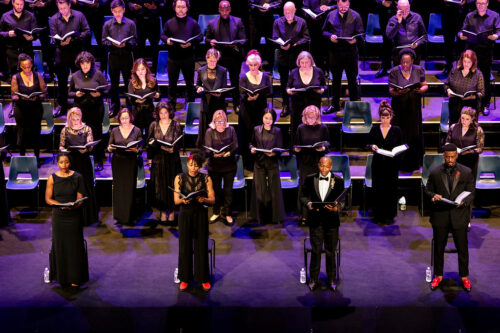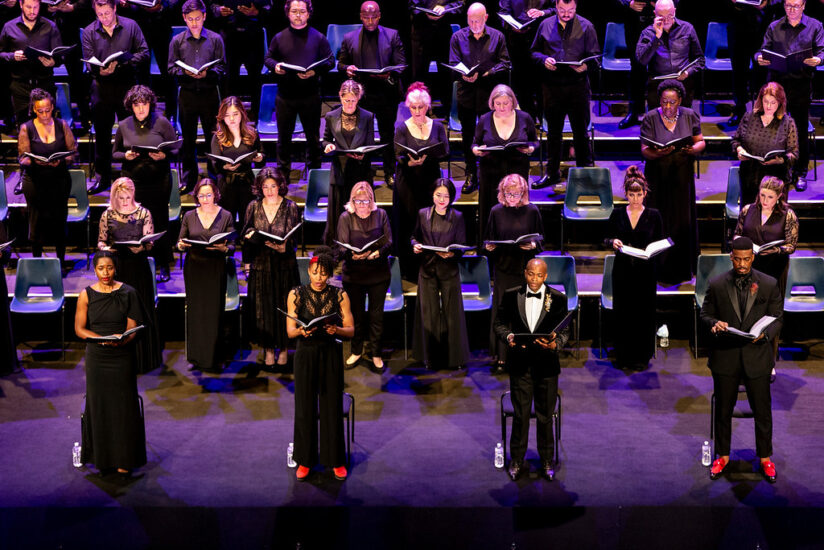 United Kingdom English National Opera’s Seven Last Words: Nardus Williams (soprano), Idunnu Münch, (mezzo-soprano), Frederick Ballentine (tenor), Soloman Howard (bass), Chorus and Orchestra of English National Opera Chorus / Eamonn Dougan (conductor, Haydn), Kellen Gray (conductor, Thompson). 13.4.2022. (CC)
United Kingdom English National Opera’s Seven Last Words: Nardus Williams (soprano), Idunnu Münch, (mezzo-soprano), Frederick Ballentine (tenor), Soloman Howard (bass), Chorus and Orchestra of English National Opera Chorus / Eamonn Dougan (conductor, Haydn), Kellen Gray (conductor, Thompson). 13.4.2022. (CC)

Haydn – Seven Last Words on the Cross (1796)
Joel Thompson – Seven Last Words of the Unarmed (2019)
How powerfully Haydn’s music speaks across the centuries. This was a rare concert performance for soloists, choir and orchestra of one of Haydn’s great masterpieces, a setting of the last phrases by Jesus. But what to couple with it?
ENO’s solution was Joel Thompson’s Seven Last Words of the Unarmed (2019), a setting of the last words of those unlawfully killed by authority figures, inspired by the shooting of Eric Garner. The parallel with the basis of the Haydn as clear as day, of course. But this was a curious evening, short but also skewed. Why was there an interval after the Haydn? We had a 20-minute interval, then came back to hear a work of only 15 minutes …
Still, let us concentrate on the positives, most if not all of which reside with the Haydn, heard in an English translation by Martin Fitzpatrick. This was a triumph. We have long known that the English National Opera’s chorus is the jewel in their crown, but how beautifully balanced they were, how fervent in their singing (the core ENO group was enhanced by some 20 additional choristers). Throughout, textures were clear; each and every singer seemed to give her or his all. The conductor, Eamonn Dougan, clearly loves the work and brought a real sense of style to the orchestra while finding lightness from the large chorus. How beautiful their cries of ‘Father’ in the second piece, how dolorous the chordal opening to the third. Haydn gives real depth and substance to the words of the apostles Matthew, Luke and John, and his settings were accorded maximal emotional weight here.
Small wonder Dougan marshals his forces so well: he is Associate Conductor of The Sixteen and founding Director of Britten Sinfonia Voices. He looks after his soloists well, too, and what a line-up this was. Nardus Williams, fresh from her triumph as Fiordiligi in the recent ENO Così fan tutte, was in radiant voice throughout, her voice meshing perfectly with the rounded, warm mezzo of Idunnu Münch, a name new to me and currently an ENO Harewood Artist. I hope to encounter her again soon. Frederick Ballentine, the tenor, and elsewhere Nick the chauffeur in ENO’s current magnificent staging of Ruders’s The Handmaid’s Tale (review here), was strong-voiced and ardent; Soloman Howard, who most recently impressed in a Philharmonia Beethoven ‘Choral’ Symphony, offered a rock-solid foundation for the quartet, but also shone in no uncertain terms in his solo moments.
This performance was balm for the soul, a true testament to Haydn’s genius, which shone through the score like a beacon. How tender are Haydn’s words about the Mother Mary, and how beautiful the response here. A real triumph for ENO’s chorus; and how rare it is to hear all four members of a solo quartet excel equally.
Twenty minutes later, and everything changed. One soloist here, briefly used (Frederick Ballentine), and a chorus that gave its all to Thompson’s score. The generating idea is certainly touching. ‘Officer, why do you have your guns out?’ a question that became the last words of Kenneth Chamberlain (66), has a lachrymose element to it, but the musical discourse is rather grey, rather generic, and that comment extends to the score generally also. There is more urgency to the setting of Trayvon Martin’s last words, the sixteen-year old’s ‘What are you following me for’; and how heart-breaking are the final words of Amadou Diallo, 23, ‘Mom, I’m going to college’, which begins with Ballentine’s well-delivered solo. The music is rather saccharine, though; the end of this movement brings about a natural hiatus before piano syncopations launch ‘I don’t have a gun. Stop shooting’ (Michael Brown, 18, with the stuttering setting stopping often on the word ‘stop’). There is a muffled clapping sound in ‘You shot me!’ (Oscar Grant, 22) that is the choir slapping their hands on their chests, which later becomes random, a viable effect but not one that convinces. Unfortunately, ‘It’s not real’ (John Crawford, 22) sounds like an excerpt from musical theatre. A certain stasis underpins the final ‘I can’t breathe’ (Eric Garner, 43), but even here the inspiration seems limited (the entrance of the piano seems rather contrived).
The performance of Seven Last Words of the Unarmed was pretty faultless, the ENO Chorus impassioned and committed throughout. But it was frankly unfair to put Thompson’s piece after the consummate genius of Haydn
Colin Clarke

It would be interesting to read your critique of the both performances had they been presented in reverse order with a longer rendition of Thompson’s Seven last Words (2019).